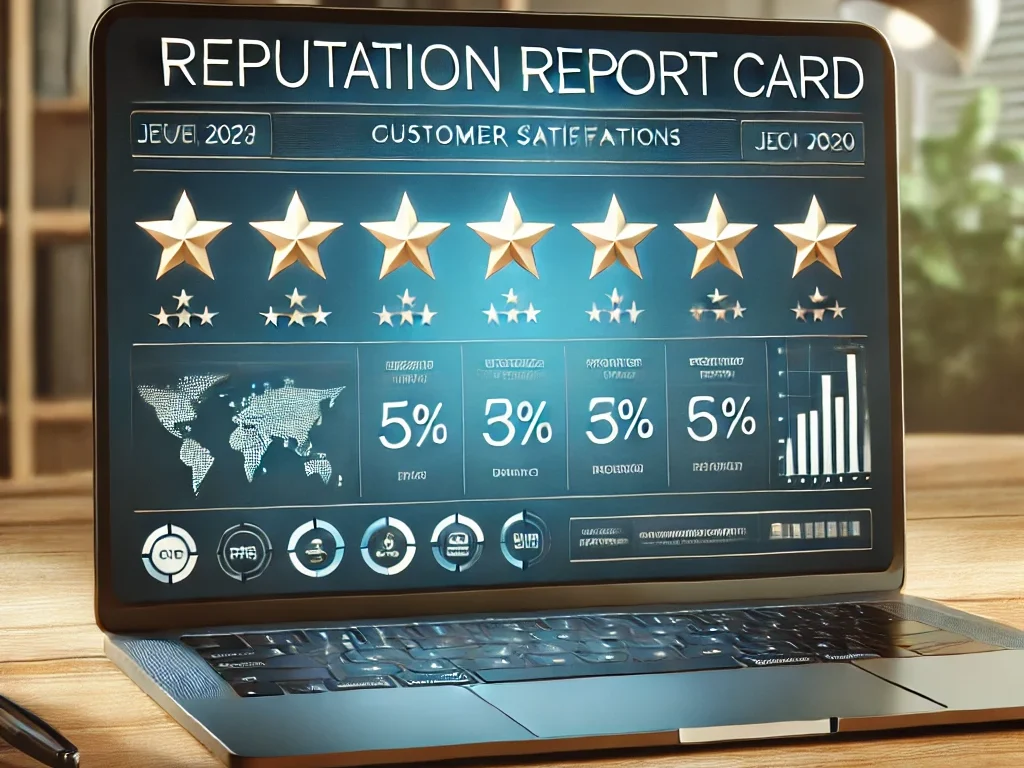In today’s digital era, the online landscape is bustling with consumer opinions and experiences. A business’s success can often hinge on its online reputation. Enter the Reputation Report Card—a tool that offers a comprehensive overview of how your brand stands in the vast digital marketplace. But what exactly does this entail, and why is it crucial for modern businesses to be aware of their standing?
Understanding the Importance of a Reputation Report Card
Imagine stepping into a room where everyone has already formed an opinion about you based solely on hearsay. This is what happens online every day. Your online reputation score acts as a report card that potential customers, partners, and stakeholders look at before making decisions. It’s a reflection of how others perceive your brand based on reviews, feedback, and social mentions. Here’s why it’s indispensable:
Trust Building: Positive scores bolster trust among potential customers.
Feedback Mechanism: It provides insights into customer satisfaction and areas of improvement.
Competitive Edge: A favourable reputation differentiates you from competitors.
Increased Visibility: Good scores improve search engine rankings.
How Do I Check a Company’s Reputation?
The question of “how do I check a company’s reputation” is increasingly common among consumers. Here are some strategies businesses can employ to ensure they maintain a stellar reputation:
Utilise Review Management Platforms: Tools like Get 5 Star Review simplify the process by aggregating reviews across platforms and offering sentiment analysis.
Regularly Monitor Social Media: Engage with customers directly and address concerns swiftly.
Conduct Surveys and Feedback Sessions: Actively seek feedback to improve services and products.
Decoding Brand Reputation Metrics
Brand reputation metrics provide quantifiable insights into how well you’re perceived in the digital realm. These metrics include:
Sentiment Analysis: Evaluates the tone of customer interactions.
Review Volume and Frequency: More frequent positive reviews indicate reliability.
Engagement Levels: Measures how often users interact with your content or posts.
Mentions and Shares: Tracks the extent of conversations around your brand.
By understanding these metrics, businesses can tailor their strategies to enhance their business reputation score effectively.

The Role of AI in Shaping Reputation Scores
As technological advancements continue to flourish, integrating AI to manage and interpret reputation data becomes vital. AI can:
Predict Behavioural Trends: By analysing historical data, AI can forecast future customer behaviour, enabling proactive management.
Automate Responses: Helps in maintaining quick communication with customers.
Enhance Personalisation: Customises strategies to align with unique customer needs.
These capabilities ensure businesses remain ahead, keeping their reputation report favourable.
Analysing Your Website Reputation Score
A pivotal component of your Report Card is your website reputation score. This score evaluates the credibility and trustworthiness of your website based on:
Security Protocols: HTTPS encryption and safe browsing practices.
Content Quality: Providing valuable, original, and regularly updated content.
User Experience: Ensuring intuitive navigation and mobile responsiveness.
Improving these aspects not only elevates your score but also enhances user engagement and loyalty.
Strategies to Improve Your Online Reputation Score
Encourage Positive Reviews: Implement systems that make it easy for satisfied customers to leave reviews.
Address Negative Feedback Promptly: Use negative comments as an opportunity to demonstrate accountability and improvement.
Leverage Influencer Partnerships: Collaborations can expand reach and impart credibility through association.
These actions collectively contribute to maintaining an optimal online reputation score.
Challenges in Managing My Online Reputation
Despite the advantages of having a robust system for managing my online reputation, challenges persist:
Handling Misleading Information: The rapid spread of false information can tarnish reputations.
Resource Limitations: Smaller firms may struggle with allocating resources for reputation management.
Adapting to Technological Changes: Keeping pace with evolving tools requires ongoing learning and adaptation.
Understanding these hurdles allows businesses to strategize effectively, ensuring sustained growth and positive reputational outcomes.
Evaluating Business Reputation Score Across Industries
Different industries have varying benchmarks for assessing their business reputation score. For instance, the hospitality sector might focus more on service-related reviews, while tech companies may prioritise product efficiency and innovation feedback. Tailoring reputation management efforts according to industry specifics is crucial for achieving desired outcomes.
Future Trends in Reputation Management
The landscape of online reputation management is ever-evolving. Key trends to watch include:
Integration with Big Data: Enhanced data analytics will offer deeper insights into customer behaviours and preferences.
Increased Focus on Authenticity: Consumers now demand genuine engagement, not just automated responses.
Sustainability and Ethical Practices: Businesses will need to display a commitment to social responsibility to earn trust.
Conclusion: Crafting a Proactive Reputation Strategy
In essence, the journey to crafting a strong Reputation Report Card begins with awareness and continuous improvement. By leveraging advanced tools and staying attuned to consumer expectations, businesses can not only protect but also enhance their reputational standing. After all, in a world where perceptions drive decisions, maintaining a stellar online presence is non-negotiable.
For businesses poised to embrace change, the opportunity to lead with integrity and trust is immense. As digital footprints continue to shape brand identities, being proactive, responsive, and strategic remains the cornerstone of exemplary reputation management.
By adopting these insights and strategies, businesses can ensure their Reputation Report Card reflects their best virtues, paving the way for sustained growth and enduring success.
FAQ: Understanding Reputation Scores
What is a reputation report card?
A reputation report card is like a grade for your brand’s online presence. It evaluates customer reviews, social media mentions, and other online feedback to show how people perceive your business.
How to calculate a reputation score?
A reputation score is calculated based on factors like online reviews, ratings, customer feedback, and social media engagement. Many tools analyze these elements and give you a score, usually on a scale from 0 to 100.
What is a good reputation score?
A good reputation score is typically above 70. The higher the score, the more trusted and well-perceived your brand is. A score of 80+ means your business has strong credibility, while anything below 50 may need improvement.
How can I check a company’s reputation for free?
You can check a company’s reputation by:
- Searching for online reviews on Google, Yelp, or Trustpilot
- Checking social media mentions and customer feedback
- Using free tools like Google Business Profile insights
- Looking at Better Business Bureau (BBB) ratings

